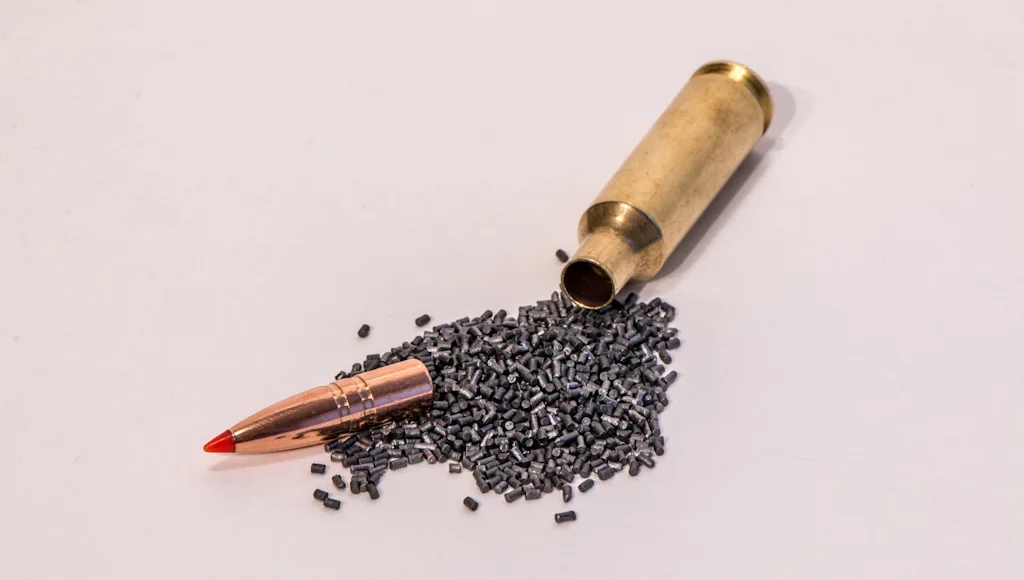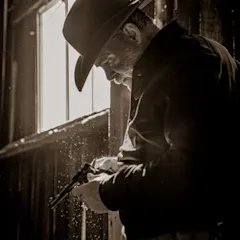_We may earn revenue from the products available on this page and participate in affiliate programs. Learn more ›
_
The idea of working as a gunsmith is appealing to many who like guns. But they might wonder, 1) it’s hard to learn how to become a gunsmith, and 2) if you can make a decent living gunsmithing. I’m not a gunsmith, and I don’t play one on the Internet. Sure, I can do some gunsmithy things, such as mounting riflescopes, installing triggers, and even sights. But when it comes to serious gunsmith work, I find a serious gunsmith, like Jerry Dove.
Dove owns Dove’s Custom Guns
in Princeton, West Virginia. He’s spent most of his life making an honest living as a gunsmith. He repairs and refinishes old guns, and even builds/customizes his own. Originally, Jerry made a name for himself customizing 1911 pistols. More recently he’s perfected a way to build exquisite take-down lever action rifles
. He also stays busy crafting Scout Rifles, making sights and scout scope mounts, and building more conventional hunting rifles. Dove also does almost all my gunsmithing work, so he was the perfect source to ask how to become a gunsmith.
Table of Contents
How to Become a Gunsmith: Education
Is it Easy to Make a Living as a Gunsmith?
How to Become a Gunsmith: Other Considerations
How to Become a Gunsmith: Education
When I asked Jerry to give some advice to anyone interested in becoming a gunsmith, he first said, “You need to have some basic mechanical ability. If you can’t change the oil in your lawnmower or put a new chain on your chainsaw, gunsmithing is probably not the vocation for you. Before I began serious gunsmithing I was a machinist, and the experience I gained there has helped me tremendously, especially when it comes to the custom gun work I do.”

You can make a living as a gunsmith, but you’ll need to go to school, find a mentor, or work through years of trial and error first. Richard Mann
Teach Yourself How to Become a Gunsmith
Dove also said there are essentially three ways to become a gunsmith. He said the path that takes the longest, and the one he would least recommend, is learning on your own. Dove is mostly self-taught, so this advice comes from experience. “Though it might be rewarding, it will take a long time and you’ll mess up a lot of good guns along the way.”
Go to Gunsmithing School
Another option Dove suggested was going to a gunsmithing school. Dove said he’s taken some gunsmithing courses at Montgomery Community College
in Troy, North Carolina. He said that it’s a great school, but that there are also other good schools across the nation. But of course, these schools do not give their information away for free; tuition can be expensive.
Find a Mentor
Dove felt the best way to become a gunsmith was to find a mentor—a respected gunsmith that will hire you for simple tasks at first, and then teach you the skills of the trade over time. That way you learn in a realistic and practical setting, and you get paid during the process.
Other Education Gunsmiths Need
Dove also has a business degree and he feels it has helped him immensely. “Running a gunsmith business is not just about working on guns,” he said. “You must work within a budget, pay taxes, develop marketing plans, and most importantly, you must learn to deal with customers. You must also have a lot of patience. Patience for the work and the customer.”
Is it Easy to Make a Living as a Gunsmith?
According to Dove, the living you can make will be based on the quality of work you do and how you treat your customers. “If you do good work, your name will get out, and the customers you have will return,” he said. “But you must also have the required tools, and tools can be expensive.” At the most basic level a good set of screwdrivers will get you started, but to do anything beyond cleaning and parts replacement, there are a lot of other tools you’re going to need. Not counting his power tools Dove has $50,000 invested in hand tools. For his mill and lathe, Dove said costs can approach twice that.

Gunsmith Jerry Dove found several niche areas to work in. He frequently builds custom takedown lever action rifles and Scout Rifles. Richard Mann
I like to classify gunsmiths into two types. There’s the gunsmith who repairs guns and the gunsmith that builds guns. Dove said you can make a living repairing guns, “A lot of gun owners want simple repairs and refinishing services,” he said. “I could keep another gunsmith busy doing just that.”
But Dove said he feels the best way to become a gunsmith and be successful is to find a niche, specialize, and offer a custom service that few or nobody else does. That’s what Dove has done with the custom take-down lever action rifles he builds. Not many other smiths will tackle that type of job, and he’s perfected it to the point he even offers switch barrel lever guns. His waiting list is long.
How to Become a Gunsmith: Other Considerations
Dove said another key to his success is that he’s always tried to be honest and fair, and that he has always charged what he thought his work was worth. “Don’t try to undercut the prices other gunsmiths charge, and be very particular in the jobs you take,” he said. “Some guns are very problematic, and others are beyond repair at a reasonable price. Those are things only experience can teach. Find a niche, and be the best in it. Otherwise, you might end up working yourself to death.”
One thing that many might overlook when learning how to become a gunsmith is that you will need a Federal Firearms License. This will allow you to order actions and receive guns for customers, and with that comes the necessity to keep good books and comply with all local, state, and federal firearms laws. “Though it’s not really a gunsmith service, you’ll likely find that your good customers will want you to order guns for them,” he said. “And if you’re customizing guns, you’ll need to be able to order them and have them shipped directly to you.”

Competent gunsmiths are also machinists and can run a milling machine or lathe with incredible precision. Richard Mann
Dove also said that just as with any retail business, you’re going to have customers who are not satisfied, and you need to be prepared and able to make it right. But he also said that eventually, you’ll run across the customer who will never be happy no matter what you do, and who quite possibly didn’t know or understand what they wanted in the first place. This is partly because gunsmithing takes time and some lose interest in the work they’ve commissioned when it comes time to pay for it. It’s also partly because a lot of folks know a lot less about guns than they think they do.
Read Next: Everything You Want to Know about Gunsmithing, with Attitude
Dove has done everything from bedding rifle stocks, installing handgun sights, and even building fantastic custom rifles for me. I also often call him for advice about a gun problem I’m having or about a gun issue I don’t understand. I’ve even called Dove for advice on non-gun mechanical issues. If you learn how to become a good gunsmith, don’t be surprised when one of your customers calls for advice on their lawn mower or some other mechanical problem they’re dealing with. Because everyone expects a good gunsmith to be able to fix damned near anything and to accomplish the impossible with every gun.


